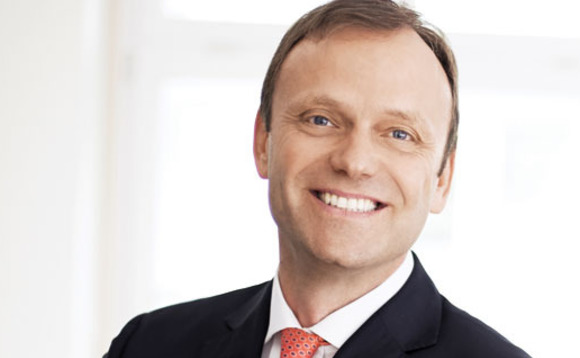
GP Profile: Afinum Management

- Closed fifth buyout fund Achte Beteiligungsgesellschaft in September 2017 on €410m
- 60 investments from six funds since 2000
- Focus on succession situations
Afinum Management closed its fifth buyout fund on €410m in September. Managing partner and co-founder Gernot Eisinger speaks to Oscar Geen about the GP's niche with succession situations in an intensely competitive market
An unprecedented amount of dry powder in both DACH-specific and pan-European buyout funds has led to increasing multiples across the region. Afinum Management's managing partner, Gernot Eisinger, says this means smaller funds struggle to compete. "On average, we pay 6-8x EBITDA," he says. "We can't compete with 10-15x in open auctions so we have to find succession situations where we can intermediate and find a good solution for the family."
Since 2000, the GP has raised five buyout funds, increasing in value each time. Its first effort closed on €94m in March 2002 and was structured as two vehicles, Afinum Beteiligungsgesellschaft and Afinum Zweite Beteiligungsgesellschaft with volumes of €74m and €20m respectively. This was followed by a €140m buyout fund, again split in two: Afinum Dritte Beteiligungsgesellschaft, which held a final close on €115m in June 2004, and Afinum Vierte Beteiligungsgesellschaft with an extra €25m.
The firm then significantly stepped up its fund size and closed Afinum Fünfte Beteiligungsgesellschaft on €230m in October 2007. Almost four years later, in April 2013, its fourth fund Afinum Siebte Beteiligungsgesellschaft closed on its €285.6m hard-cap, before its fifth and most recent fund held a final close on €410m in September 2017. More than 85% of investors re-upped in both of Afinum's most recent funds.

In addition to this, Afinum manages a €210m growth fund, backed partially by state money. "It's hard to believe nowadays, but after the crisis there were a lot of liquidity issues in mid-cap companies, so KfW and Commerzbank used their funds to set up a fund, which we won the contest to manage," Eisinger explains. This vehicle has more restrictions on leverage and less flexibility than Afinum's LP funds due to the public money used, but has still made 10 platform acquisitions and two bolt-ons.
Almost half of Afinum's transactions have been completed in the industrials sector, according to unquote" data, although its activity in the technology sector has picked up in recent years. In the past 12 months it has acquired two software companies: it bought travel software business Midoco in December 2016 and made the first investment from its latest fund in IT Works, a digital marketing platform, in October 2017.

Traditional model
A focus on succession situations means dealing mostly with family-owned businesses and this requires a different approach and skill set than that taken by the larger funds. "Sometimes what we do is closer to very personal succession discussions than finance," says Eisinger. "We sit around the table with a family and we talk and we help them work out whether they want to sell their company and who would be the best successor."
This can end up in very broad and personal conversations, Eisinger explains: "We had a family where the daughter worked for the company and she was worried that other employers would not be as flexible with maternity leave and modelling her career around her family." It is easy to see why a multi-billion euro buyout firm might not have the time or inclination to deal with these kinds of issues.
The GP aims to build trust and relationships with the families that it buys businesses from, to the extent that it often ends up taking commitments to its buyout funds from them. This is part of the solution to the legacy problem that Eisinger describes: "Families trust us as a partner but they also ask: 'What about when you exit?' To which we always tell them: 'If what you are doing is beneficial to the company it will also be beneficial to the next owner and they will keep you on.'"
Apart from the families and entrepreneurs of its former and current portfolio companies, Afinum tries to keep its LP base well diversified. "We don't use a placement agent, but whenever I speak to placement agents they tell me that our LPs base and structure are 100% in line with where the market is at the moment," says Eisinger.
The firm has seen the effect that being too heavily reliant on one type of investor has had on its competitors, and is careful to avoid this kind of over exposure, Eisinger explains. "Before we had raised our 2013 fund, one of our competitors raised a fund using 90% insurance money," he says. "Then the rules about insurance companies investing in private equity changed and they lost 90% of their LP-base. So we try to open our funds up to lots of different types of investors."
Challenges and challengers
The traditional LP fund model has suited Afinum well, but it is beginning to encounter difficulties and is struggling to remain competitive with certain newcomers. "There are some challengers to the private equity model at the moment," says Eisinger. "There are family offices and captive vehicles that are just aggressively deploying capital. They'll do highly leveraged transactions, mezzanine and even unitranche, and they have much lower return expectations, so that is causing tension with the more traditional funds."
Afinum describes its own use of debt as 'moderate': around 75% of the transactions in the current buyout fund use between 30-50% of debt. The ready availability of debt-financing options is part of the market dynamic that is driving such high pricing and Eisinger is wary of this. "Traditionally we have worked mostly with local banks," he says. "Nowadays some of the bigger international banks like Unicredit, Credit Suisse and UBS are also very active in our sectors. Private debt funds are very aggressive; they have problems deploying their capital and they drive up prices. We haven't worked with one so far."
Being a smaller fund and being registered domestically also has some disadvantages. Larger funds can use loan facilities to bridge their drawdowns and boost their IRR, and this is not an option open to Afinum, as Eisinger explains: "The big players use fund financing to effectively reduce their hurdle. We are registered as an asset managing KG so we're not allowed to use these methods." This means the firm has a slight competitive disadvantage compared to the big funds, but it is important to certain business owners that their ultimate parent is registered in Germany so it benefits from some advantages as well.
Other than the intensely competitive environment, Eisinger says one of the biggest challenges the firm faces is finding the right people to lead its portfolio companies. The company does a lot of management buy-ins due to its focus on succession situations, so getting the right talent is important. Eisinger says: "Exceptional managers can live wherever they want and often they don't want to live in very distant rural areas." He believes this will continue to be a challenge with younger founders and thinks becoming more operationally involved is likely to be the future. "We use headhunters and we use C-level coaches, and I think these solutions will become more and more important for us."
The type of person that counts as "the right kind of person" is changing as well. Level20, an initiative to boost female participation in private equity, launched its German division headed by Dörte Höppner in October. Eisinger recognises the value of bringing a wider range of perspectives into the industry but has struggled to recruit many women so far. "When LPs do due diligence on us, we see from their feedback that the female auditors bring very valuable and diverse perspectives," he says. "We would like to benefit from this as well but at the moment it's not possible. If the regulator would force us to employ one third women we would honestly not be able to do it."
Key People
• Gernot Eisinger, managing partner, co-founded the firm in 2000. He previously managed the investment business of Triumph-Adler and worked as a strategy consultant with Bain & Company in Munich.
• Thomas Bühler, managing partner, co-founded the firm. He previously worked at the investment business of Triumph-Adler and worked as a strategy consultant with Bain & Company in London.
Latest News
Stonehage Fleming raises USD 130m for largest fund to date, eyes 2024 programme
Multi-family office has seen strong appetite, with investor base growing since 2016 to more than 90 family offices, Meiping Yap told Unquote
Permira to take Ergomed private for GBP 703m
Sponsor deploys Permira VIII to ride new wave of take-privates; Blackstone commits GBP 200m in financing for UK-based CRO
Partners Group to release IMs for Civica sale in mid-September
Sponsor acquired the public software group in July 2017 via the same-year vintage Partners Group Global Value 2017
Change of mind: Sponsors take to de-listing their own assets
EQT and Cinven seen as bellweather for funds to reassess options for listed assets trading underwater








